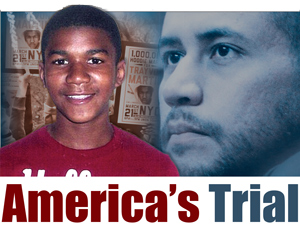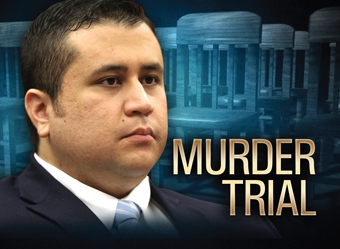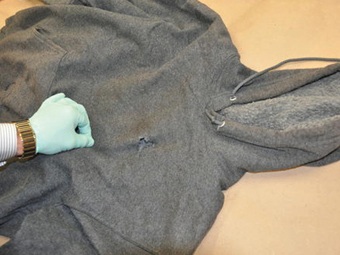By Charlene Muhammad CHARLENEM

(FinalCall.com) – As the trial for the killer of Florida teen Trayvon Martin moved toward closing arguments, America’s racial divide was clearly evident as jurors considered whether George Zimmerman racially profiled, stalked and killed the teenager or acted in self-defense. The trial also stands as an important marker in the history of the American legal system, racial realities and race relations in the country.
The Trayvon Martin case is historically linked to the case of 14-year-old Emmett Till, killed by two White men in Mississippi in 1955, according to Carl Dix, a co-founder of the Oct. 22 Coalition Against Police Brutality and the Criminalization of a Generation.
An all-White jury found Emmett Till’s killers not guilty. His death and open casket with his shockingly abused corpse helped fuel the civil rights movement. “What this trial is about is, is this society going to give the okay to murdering a young Black man because he is Black?” Mr. Dix commented.
“Essentially, George Zimmerman’s defense is, I saw a young Black man. I decided he was a criminal. I followed him, confronted him. And I shot him. What’s the problem?”
The Zimmerman self-defense claim is a fig leaf because he stalked and confronted Trayvon Martin, Mr. Dix said, echoing sentiments shared by many in daily social media posts about the nationally televised trial.
There’s very little question as to who precipitated all of the action, even though there’s question in Mr. Zimmerman’s mind, Mr. Dix continued. He cited a national TV news interview where Mr. Zimmerman said he wouldn’t change anything from that fateful night.

“In other words, he feels everything he did is right, and this case is about whether this society is going to endorse that. What this case is, is racial profiling: You see a young Black man. You can decide he’s a criminal and you can treat him as such, whether you’re a police officer–and police officers have been doing this forever–but also if you’re not a police officer, just any ordinary citizen,” Mr. Dix added.
The seating of a nearly lily-White jury is also reminiscent of the Till case, according to Mr. Dix. That’s also why he wants people to act now and not wait for the verdict.
“If we wait to see what the court does, it’s going to do what it already did do. The legal system is going to do what it already did in this case, let the murderer walk because he already walked once. And the only reason they put him on trial is because people refused to accept it,” Mr. Dix said.
Mr. Dix, along with the Stop Mass Incarceration Network, says it is important that activism that forced Mr. Zimmerman to trial is still seen and sustained.
“We are all Trayvon. That could have been my nephew. I mean, I have daughters … Even if you’re not Black, you have to say, I don’t want to live in a world where this can happen to somebody because of the color of their skin,” Mr. Dix told The Final Call.
Vigils should be held everywhere when the case goes to the jury, he said.
“I know that there are people saying, well all we really wanted was a trial but then I would say, in the Rodney King case, we got a trial and then they exonerated the cops and then there was a rebellion and they had a trial again,” Mr. Dix pointed out.
“In the Emmett Till case there was a trial. They just let the people go after putting them on trial. It’s not enough to get a trial in a criminal injustice system that’s stacked against you. We need justice and we need to stand up and say we need justice and not accept anything short of that.”
An inability to defend Black life?
“I think what we’re looking at more than anything else is the lack of value of Black life,” said Dr. Joy DeGruy, author of “Post-Traumatic Slave Syndrome: America’s Legacy of Enduring Injury and Healing.”
The researcher and educator’s statement summed up the sentiments of many. Blacks insist Trayvon Martin would still be alive if he was White. He was racially profiled, followed, attacked and ultimately killed, which is a pattern of the suffering of Black life in America, they argue.
Many Whites, as expressed in national and right wing media and blogs, are towing the line with Mr. Zimmerman’s attorneys. Trayvon Martin caused his own death by being suspicious, defense attorneys have argued. He was aimlessly walking in the rain, and then he confronted and attacked the man who had been following him, they claim.
The world is watching the Zimmerman trial because it is about Black and White, not self-defense, and the devaluing of Black life exhibited in the Martin death happens over and over again, analysts said.
According to Dr. DeGruy, part of the context for devaluing Black historically rests in the Fugitive Slave Act of 1850. The act called for government officials to capture and return runaway slaves.
Someone Black could have been free all their lives but without proof, Whites could simply assert they were runaways and Blacks would lose their freedom, Dr. DeGruy explained.

“If you were to take a look at this Stand Your Ground and this whole idea that all he (George Zimmerman) needed to do was assert his position and walk out of a police station after having taken someone’s life … speaks to the historical context of not even having the freedom to protect one’s own life,” Dr. DeGruy said.
Devaluing Black life has been consistent in America, but unfortunately, Blacks have begun to devalue their own lives, she noted.
The problem surrounding the Trayvon Martin death and Black life in general is rooted in America’s injurious pattern of racism and Blacks must be prepared to have a dialogue whatever the trial outcome, Dr. DeGruy said.
Blacks and Whites: Two different worlds and reality
“The problem is again the irreconcilable perception of White and Black. And when I watch these evening talk shows, the opinions are almost divided racially right down the line as to who the aggressor was,” said Atty. Ava Muhammad, national spokesperson for Minister Louis Farrakhan and Nation of Islam student minister.
Whites say the issue of aggression began when the two encounter each other, but Blacks say the aggression occurred when Mr. Zimmerman left his car, Muhammad noted. She agrees with the second view.
At Final Call presstime July 8, the defense team was presenting its case, offering witnesses favorable to their client, which included those who said the haunting voice on a 911 tape calling for help was Mr. Zimmerman. This followed testimony from Sybrina Fulton, Trayvon’s mother saying it was her son, and Mr. Zimmerman’s mother saying it was her son. Police officials, including a former Sanford police chief and detectives, said Tracy Martin said under his breath that the voice on the tape was not his son. The father denied making the comment. He testified July 8. “I kind of pushed away from the table and said, ‘I can’t tell,’ ” said Mr. Martin.
The law firm of Martin family attorney Benjamin Crump also released a recording of Mr. Zimmerman telling police the voice heard pleading for help during the 911 call was not his.
Prosecution witness Rachel Jeantel, the friend who last spoke to Trayvon Martin, was criticized after her June 26 and June 27 testimony. Ms. Jeantel apparently was still trying to cope with what she heard and experienced given emotional pauses on the witness stand.
The 19-year-old, dark-skinned and heavyset, suffered ridicule as inarticulate and even belligerent under defense attorney questioning. The testimony of Trayvon’s older brother Jahvaris Fulton was widely lauded as the 21-year-old stated the voice on the 911 tape was his brother, who he described as easygoing and funny.
Reaction to Ms. Jeantel’s testimony doesn’t change the fact that George Zimmerman killed Trayvon Martin, said John Page, president of the National Bar Association, the nation’s oldest and largest association of Black lawyers and judges.
“She had no role in what happened between them. She’s just giving an indication that ‘hey, Trayvon was concerned on his way home and had a fear, a real fear of some sort.’ Period. That’s it. And he was put into fear by this man named Mr. Zimmerman. That’s all we can take away,” Atty. Page told The Final Call.
“You don’t have to like this person and unfortunately that’s where human nature comes in. We must resist our human nature to impugn anything from a witness to the victim. The victim in this case was simply engaged and confronted by the person who ended up taking his life, who should have been more properly trained not to do that.”
A lot hinges on what the jury will be asked to focus on after all the evidence is presented, he said.
So of what’s been heard so far is a witness from neighborhood watch saying volunteers are trained not to confront or engage anyone and to let police do their job. Jurors also heard a responding officer say he arrived on the scene within minutes.
“So there was no need for any interaction, for any continued surveillance or following this young person, whatever you want to characterize it as … If you think about everything that Mr. Zimmerman did, there should have been a stop, no matter what,” Atty. Page insisted.
Prosecutors have argued all along George Zimmerman profiled Trayvon Martin that night. Profiling can be verbal, non-verbal, following somebody and looking at them in a particular way, Atty. Page explained.
Profiling is something Blacks experience as a community, and the problem becomes when profiling, an admitted, often used tool by law enforcement, becomes limited to racial profiling, he continued.
The attorney cited two historic Bronx, N.Y. cases, Eleanor Bumpers and Amadou Diallo, where profiling ended in law enforcement’s deadly use of force.
Eleanor Bumpers, a 60-year-old grandmother, was fatally shot in 1984 by officers who’d gone to her home to allegedly collect $387 in back rent. But, according to a Final Call article, police crashed through her front door. Alarmed, she grabbed a knife, police said, and lunged toward them.
In 1999, Mr. Diallo was killed after four officers fired 41 shots as he stood on the stoop of his Bronx building. The officers, all White, said they believed his wallet was a gun.
“We need to stay ever vigilant on this and allow the justice system to work. We can only hope that the jury instructions, the rest of the evidence in testimony leads to a just result because here a young life has been lost unnecessarily,” Atty. Page said.












